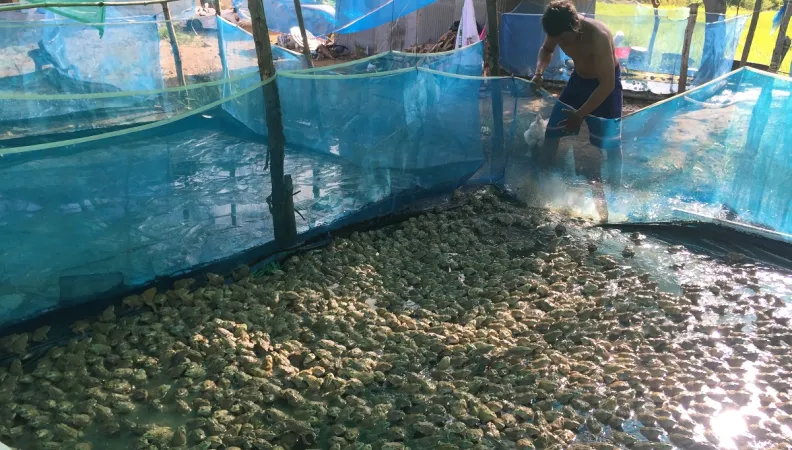Share the page
Using Aquaculture to Shore up Food Security
Published on

To cope with the economic consequences of Covid-19 in Cambodia, the CaPFish-Aqua project is supporting the aquaculture sector to shore up food security and diversify household economic activities in rural areas.
The Covid-19 pandemic has taken its toll on the Cambodian economy and on the tourism, garment and construction sectors in particular. Indeed, analysts predict a fall in household incomes and a rise in the poverty rate.
In anticipation of growing difficulties in obtaining affordable food in the coming months, Cambodia’s Ministry of Agriculture, Forestry and Fisheries, the European Union and Agence Française de Développement have redirected existing aid to aquaculture in Cambodia (CapFish project) in new actions aimed at households affected by the pandemic.
Adapting production to meet needs
Fish farmers must wait a long time before certain kinds of marine life are ready for market. It takes nine to 10 months for species such as Pangasius (shark catfish) or Channa (snakeheads) to reach market size. To shorten the cycle and help farmers generate income in fewer than four months, the project aims to change production techniques and raise shorter-cycle species such as frogs (Hoplobatrachus rugulosus) and hybrid catfish (Clarias sp.). Robust and in high demand in local markets, they can be grown in small tanks, which households can install in their gardens, allowing for family participation.
The project will finance inputs (bait and feed) required to start the first cycle, and initial revenues are to be reinvested in subsequent production cycles. This support is programmed for three cycles of production, and support to producers will be provided by hatcheries and nurseries contracted by the project, to ensure sustainability and capacity building.
This approach will also contribute to the creation of fish farmers' groups by establishing links between producers and hatcheries, an objective of the CapFish-Aqua project.
Enhancing food security
Thanks to the project, three production cycles should be possible by June 2021, thus contributing to food and nutritional security in rural areas, while generating additional income for fish farmers. For a 90-day cycle, households will be able to produce about 150 kg of catfish or 200 kg of frogs, representing respectively a gross income of $900 for frogs and $688 for catfish.
At least 2,000 households that have been financially affected by the Covid-19 pandemic will benefit from this project, across 10 provinces.
The content of this project information sheet falls under the sole responsibility of the AFD and does not necessarily reflect the opinions of the European Union.
